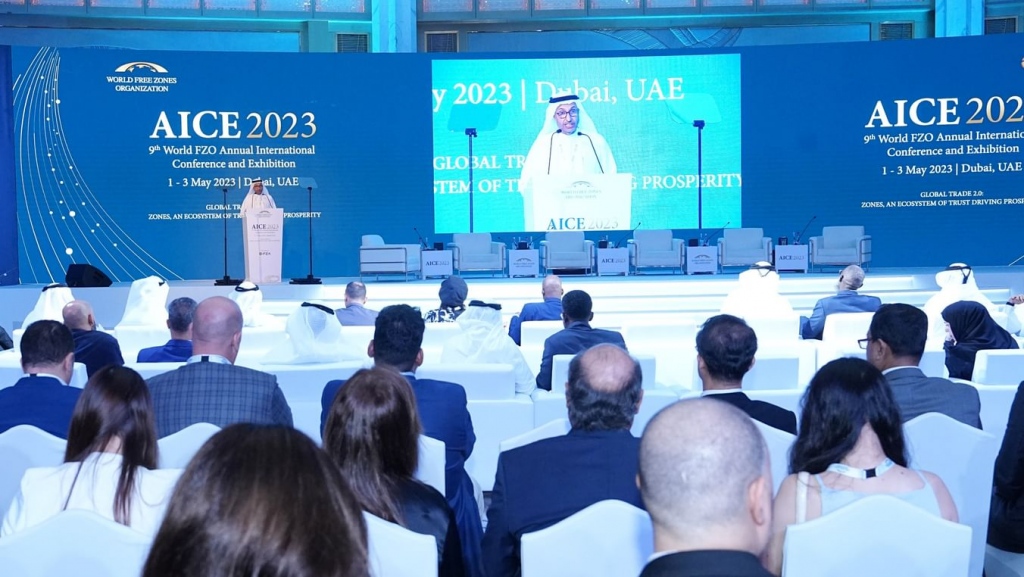
Under patronage of Mohammed bin Rashid, Dubai to host annual World Congress of the World Free Zones Organisation in September
Under the patronage of His Highness Sheikh Mohammed bin Rashid Al Maktoum, Vice President and Prime Minister of the UAE and Ruler of Dubai, Dubai is set to host the 10th edition of the annual World Free Zones Organisation (World FZO) World Congress. The event will take place in Madinat Jumeirah from 23-25 September, under the theme ‘Zones and the Shifting Global Economic Structures – Unlocking New Investment Avenues’. The congress will address key topics and priorities within the sector on a global scale.
This year’s event marks the 10th anniversary of the World Free Zones Organisation and will be hosted in Dubai for the second consecutive year and the fifth time overall since its inception. The previous edition was among the largest in World FZO’s history, contributing significantly to its ongoing success.
The 10th edition will gather representatives from economic zones worldwide, reflecting the World FZO’s commitment to advancing the crucial role in global trade played by economic zones, through which more than a third of global trade flows. The event will emphasise the impact of these zones in supporting national economies, facilitating trade exchanges, boosting commercial transactions, driving the digital economy, attracting foreign investments, and supporting other economic sectors.
This year’s congress is expected to draw representatives from over 100 countries, including more than 2,000 global and regional business leaders, free zone officials, and a diverse group of experts, specialists, and decision-makers in the free zone, logistics services, and multilateral organisation sectors. Additionally, many investors, entrepreneurs, academics, and representatives from various governmental and semi-governmental entities and major companies involved in these sectors are anticipated to participate.
Dr. Mohammed Al Zarooni, Chairman of the World Free Zones Organisation, said: “Hosting the 10th World FZO World Congress reflects Dubai’s commitment to actively contributing to the development of the global system of economic zones, which serve as the backbone of international trade in our current era. This aligns with the Emirate’s drive to double its foreign trade to reach AED 25 trillion and its goal to establish trade corridors with 400 new cities worldwide by 2033, in accordance with the Dubai Economic Agenda D33 and its ambitious targets.
“We look forward to organising another successful edition in Dubai that aligns with the UAE’s efforts to elevate its position as a global economic hub within major economic groups, in line with the UAE Centennial 2071. This event’s growing strategic and vital importance supports efforts to achieve sustainable economic development, build and consolidate trade relations, and establish partnerships between economic zones in the World FZO’s member countries. Additionally, the congress aims to expand its focus to include modern economic sectors that embrace Artificial Intelligence, the Fourth Industrial Revolution, and advanced technology. This supports the establishment of national economies based on knowledge and innovation, ultimately contributing effectively to comprehensive growth and prosperity in the global economy,” he added.
Dr. Al Zarooni stated that holding the event in Dubai offers a renewed opportunity to present in-depth visions and anticipate the future of the economic zones sector globally. It fosters constructive and fruitful discussions among all stakeholders on ways to facilitate business, connect various markets, and provide customers with cost-effective processes. This aligns with the World FZO’s efforts to elevate the sector, keep pace with rapid global developments, and encourage the adoption of the highest standards, the latest legislation, and policies. By applying the best global practices and leveraging emerging trends and innovations, economic zones can attract companies and investors, offering them competitive advantages, exchanging information and knowledge, and cooperating to develop the sector's role in economic and social development. This increases the Organization’s responsibility and efforts to advance the system of economic zones, enhancing the sustainability, flexibility, and prosperity of global trade.
To date, the Organisation has more than 1,600 members from 141 countries, with a global representation through 12 regional offices around the world and 42 national focal points. The Organisation’s role continues to grow as free zones increasingly depend on its contributions, services and network of qualitative strategic partnerships that bind its members. Free zones have grown in terms of their number, size, importance, and position in the value chain. They have also diversified their activities to include new sectors, such as Artificial Intelligence, financial technology, healthcare, and digital commerce, alongside traditional sectors. This expansion has resulted in significant growth in employment opportunities and the contribution of free zones to the global economy in various ways.
Since its establishment a decade ago, the World FZO has been dedicated to strengthening and expanding its membership base, providing high-quality, diverse, and comprehensive services to its members. The Organization is committed to fostering constructive dialogue among all parties and is keen to create opportunities for cooperation to achieve its strategic goal of promoting growth and prosperity for global economies through the free zone model.



























